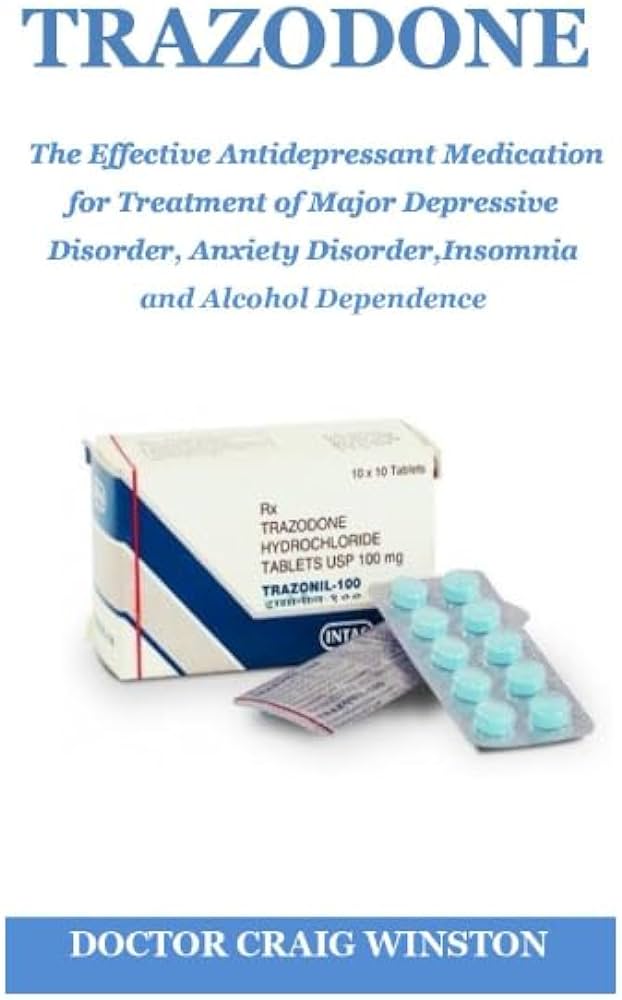Outline
- Introduction
- Brief overview
- Importance of understanding its uses and effects
- What is Trazodone?
- Definition and classification (SARIs)
- Primary purpose: treating major depressive disorder
- How Does Work?
- Mechanism of action
- Effects on serotonin levels in the brain
- Common Uses
- Depression
- Anxiety disorders
- Insomnia
- Chronic pain management
- Benefits
- Improved mood
- Better sleep
- Anxiety relief
- Versatility in treating multiple conditions
- Potential Side Effects
- Common side effects
- Drowsiness
- Dizziness
- Dry mouth
- Constipation
- Blurry vision
- Serious side effects
- Priapism
- Serotonin syndrome
- Allergic reactions
- Common side effects
- Precautions and Interactions
- Importance of informing healthcare provider
- Potential interactions with other medications
- MAO inhibitors
- Other antidepressants
- Blood thinners
- Conclusion
- Summary of trazodone’s versatility and benefits
- Emphasis on consulting healthcare provider
- Call to action: visiting the guide on mental health and providing feedback on the GPT store page
Trazodone is a medication widely prescribed for its antidepressant and sedative effects. It belongs to the class of drugs known as serotonin receptor antagonists and reuptake inhibitors (SARIs). This article delves into the uses, benefits, and potential side effects of trazodone, providing a comprehensive overview for those considering or currently using this medication.
What is Trazodone?
Trazodone is primarily used to treat major depressive disorder. It works by balancing the levels of serotonin in the brain, which helps improve mood and emotional stability. Besides its antidepressant properties, trazodone is also known for its ability to alleviate anxiety and insomnia, making it a versatile medication in mental health treatment.
How Does Work?
Trazodone increases the amount of serotonin, a natural substance in the brain that helps maintain mental balance. It blocks certain serotonin receptors while inhibiting the reuptake of serotonin, making more serotonin available in the brain. This dual action helps enhance mood, reduce anxiety, and promote sleep.
Common Uses
- Depression: Trazodone is most commonly prescribed to treat depression. It helps alleviate symptoms such as persistent sadness, loss of interest in activities, and feelings of hopelessness.
- Anxiety Disorders: Due to its calming effects, trazodone is often used to manage anxiety disorders, helping reduce excessive worry and tension.
- Insomnia: Trazodone’s sedative properties make it effective in treating insomnia. It helps individuals fall asleep faster and stay asleep longer, improving overall sleep quality.
- Chronic Pain Management: Trazodone can be used off-label to manage chronic pain, particularly when it is associated with depression and anxiety.
Benefits
- Improved Mood: By increasing serotonin levels, trazodone helps enhance mood and emotional well-being.
- Better Sleep: Its sedative effects promote better sleep patterns, helping those with insomnia achieve restful sleep.
- Anxiety Relief: Trazodone’s calming properties make it effective in reducing anxiety and stress.
- Versatility: Trazodone’s ability to treat multiple conditions makes it a valuable option for individuals with co-occurring mental health issues.
Potential Side Effects
While trazodone is generally well-tolerated, it can cause side effects in some individuals. Common side effects include:
- Drowsiness: Due to its sedative nature, trazodone can cause drowsiness, particularly when first starting the medication.
- Dizziness: Some individuals may experience dizziness or lightheadedness.
- Dry Mouth: Dry mouth is a common side effect but can usually be managed with increased fluid intake.
- Constipation: Trazodone may cause constipation in some users.
- Blurry Vision: Some people may experience changes in vision.
Serious Side Effects
Though rare, trazodone can cause more serious side effects, such as:
- Priapism: A prolonged and painful erection, which requires immediate medical attention.
- Serotonin Syndrome: A potentially life-threatening condition characterized by high levels of serotonin, leading to symptoms such as agitation, hallucinations, rapid heart rate, and increased body temperature.
- Allergic Reactions: Severe allergic reactions, though uncommon, can occur and manifest as rash, itching, swelling, or difficulty breathing.
Precautions and Interactions
Before starting trazodone, it is essential to inform your healthcare provider about any other medications you are taking, as trazodone can interact with various drugs, including:
- MAO Inhibitors: Combining trazodone with monoamine oxidase inhibitors (MAOIs) can lead to severe interactions.
- Other Antidepressants: Using multiple antidepressants can increase the risk of serotonin syndrome.
- Blood Thinners: Trazodone may enhance the effects of blood thinners, increasing the risk of bleeding.
Conclusion
Trazodone is a versatile and effective medication for treating depression, anxiety, and insomnia. By balancing serotonin levels in the brain, it helps improve mood, reduce anxiety, and promote better sleep. While it offers significant benefits, it is important to be aware of potential side effects and interactions with other medications. Always consult with a healthcare provider before starting or adjusting trazodone to ensure it is the right medication for your specific needs.
FAQs
Q1: What is commonly use for?
A1: It is primarily used to treat major depressive disorder, anxiety disorders, and insomnia. It can also be prescribe off-label for chronic pain management.
Q2: How does work in the brain?
A2: It can increases serotonin levels in the brain by blocking certain serotonin receptors and inhibiting serotonin reuptake, which helps improve mood, reduce anxiety, and promote sleep.
Q3: What are the common side effects of trazodone?
A3: Common side effects include drowsiness, dizziness, dry mouth, constipation, and blurry vision. These are usually mild and manageable.
Q4: Can trazodone cause serious side effects?
A4: Yes, although rare, serious side effects such as priapism (prolonged and painful erection), serotonin syndrome, and severe allergic reactions can occur. Immediate medical attention is necessary if these symptoms arise.
Q5: Is trazodone safe to use with other medications?
A5: It can interact with other medications, particularly MAO inhibitors, other antidepressants, and blood thinners. It is important to inform your healthcare provider about all medications you are taking to avoid potential interactions.


